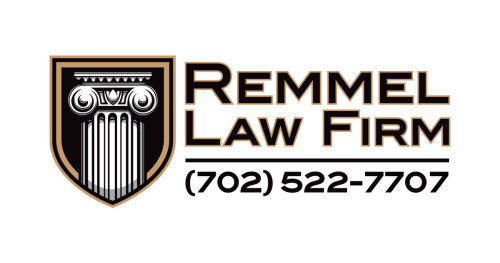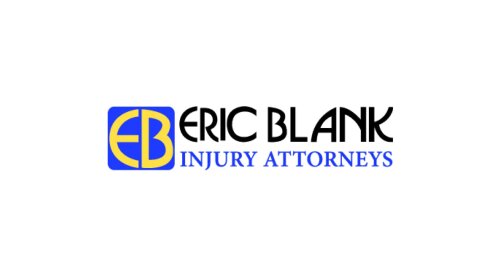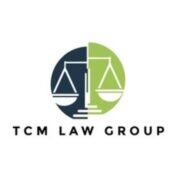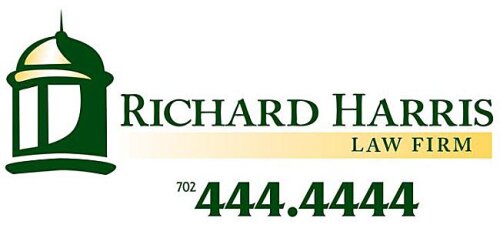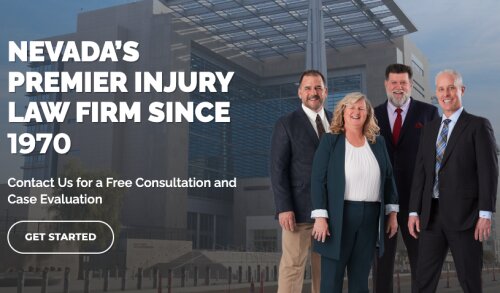Best Restructuring & Insolvency Lawyers in Las Vegas
Share your needs with us, get contacted by law firms.
Free. Takes 2 min.
List of the best lawyers in Las Vegas, United States
About Restructuring & Insolvency Law in Las Vegas, United States
Restructuring and insolvency law covers the legal processes and tools used when individuals or businesses cannot meet their financial obligations to creditors. In Las Vegas, Nevada, practitioners handle a mix of federal bankruptcy cases and state-law procedures designed to resolve distressed financial situations. Federal bankruptcy filings - including Chapter 7, Chapter 11, and Chapter 13 - are heard in the United States Bankruptcy Court for the District of Nevada, which has courthouses serving Las Vegas and surrounding communities. State-court remedies and out-of-court workouts are also commonly used to address creditor claims, liquidate assets, or reorganize business operations outside of the federal bankruptcy system.
Las Vegas has a large and diverse economy that includes hospitality, real estate, construction, retail, and small businesses. This mix creates frequent needs for both business restructurings and individual insolvency assistance. Local practitioners combine knowledge of federal bankruptcy law, Nevada state law, and the practical realities of the Las Vegas marketplace to guide debtors, creditors, secured lenders, landlords, and other stakeholders through insolvency-related disputes and negotiations.
Why You May Need a Lawyer
Insolvency and restructuring matters involve complex legal rules, strict deadlines, and potential consequences that extend beyond immediate financial problems. You may need a lawyer in the following common situations:
- You are considering filing for bankruptcy and need to choose the right chapter and understand eligibility, exemptions, and consequences.
- Your business is unable to pay vendors, suppliers, or lenders and you need advice on restructuring options, creditor negotiations, or running a Chapter 11 reorganization.
- You face foreclosure, repossession, wage garnishment, collection lawsuits, or creditor seizures and need to evaluate relief options or defenses.
- You were threatened with or served with a motion for relief from the automatic stay, a motion to convert or dismiss a case, or a claim for fraudulent transfer or preferences arising from a bankruptcy filing.
- You are a creditor trying to collect from a debtor and want to understand your rights, lien priorities, and enforcement remedies under Nevada law and federal law.
- You are a business owner considering an assignment for the benefit of creditors or a receivership as an alternative to a formal bankruptcy.
- Complex creditor committees, DIP financing, asset sales, or cross-border issues are part of the situation and require experienced negotiation and court advocacy.
Local Laws Overview
Restructuring and insolvency practice in Las Vegas is shaped by both federal bankruptcy law and Nevada state law. Key legal aspects to understand include:
- Federal Bankruptcy Code framework - Bankruptcy is governed by federal law. Chapters most commonly used are Chapter 7 for liquidation, Chapter 11 for business reorganization or large individual restructurings, and Chapter 13 for wage-earners with regular income. Subchapter V of Chapter 11 offers streamlined procedures for small business reorganizations.
- Nevada exemption system - Whether an individual can protect specific property from liquidation depends on exemptions. Nevada provides a set of state exemptions that may protect equity in a residence, personal property, retirement accounts, tools of trade, and certain wages, but exemption rules and amounts can change over time. Choosing between state and federal exemptions, where permitted, requires careful analysis.
- Bankruptcy Court local rules and practice - The District of Nevada has local rules and standing procedures that affect filings, chapter 11 plan deadlines, motion practice, and electronic filing requirements. Local practice also dictates how the court manages hearings in Las Vegas.
- Non-bankruptcy remedies - Nevada law offers state-court remedies such as receiverships, foreclosures, mechanics lien enforcement, garnishments, and assignments for the benefit of creditors. These remedies may be used instead of, or in conjunction with, bankruptcy.
- Secured creditor rights and lien priority - Nevada has specific rules on perfecting and enforcing liens, recording security interests, and determining priorities among competing creditors. Property subject to a properly perfected security interest can often be repossessed or foreclosed outside of bankruptcy unless the debtor obtains a stay.
- Preference and fraudulent transfer exposure - Under federal law, trustees in bankruptcy can pursue preference actions and fraudulent transfer claims to recover assets that improperly left the bankruptcy estate before filing. Nevada law also governs constructive fraud and fraudulent conveyance actions in some contexts.
- Taxes and governmental claims - Federal and state tax obligations, and claims by governmental agencies, have special treatment in bankruptcy and can affect the timing and feasibility of restructurings.
Frequently Asked Questions
What is the difference between insolvency and bankruptcy?
Insolvency is a financial condition - when liabilities exceed assets or a person or business cannot pay debts as they come due. Bankruptcy is a legal process under federal law that provides formal remedies for insolvency, such as liquidation or reorganization. Insolvency does not automatically mean bankruptcy; parties often pursue out-of-court workouts or state-law options before filing.
How do I choose between Chapter 7, Chapter 11, and Chapter 13?
Chapter 7 typically results in liquidation of nonexempt assets to pay creditors and is often used by individuals and small businesses without viable reorganization plans. Chapter 11 is a reorganization process designed for businesses and individuals with complex debts or significant assets who want to stay in business and restructure liabilities. Chapter 13 is available to individuals with regular income and allows them to repay creditors over a three- to five-year plan while keeping most property. The right choice depends on income, assets, goals, creditor makeup, and eligibility rules.
Can I keep my home if I file bankruptcy in Las Vegas?
Possibly. Whether you can keep your home depends on the equity in the property, the amount of homestead or other exemptions available under Nevada law, your chapter choice, and whether you can continue making mortgage payments. Exemptions may protect a portion of equity, but secured creditors can still foreclose if plan payments or contractual mortgage payments are not maintained. Consult an attorney to analyze exemptions and mortgage status.
What alternatives to bankruptcy should I consider?
Alternatives include negotiated workouts with creditors, informal forbearance agreements, modifications of loan terms, voluntary assignments for the benefit of creditors, receiverships, debt settlement, or structured repayment plans. For businesses, out-of-court restructuring or debt-for-equity swaps may preserve value without the costs and publicity of bankruptcy. Each alternative has trade-offs in legal protection and enforceability.
How long does a typical bankruptcy case take in Nevada?
Timing depends on the chapter and complexity. A Chapter 7 individual case often completes in a few months from filing to discharge. Chapter 13 plans typically run three to five years. Chapter 11 reorganizations can vary widely - from several months for a small Subchapter V case to a year or more for complex business reorganizations. Local court scheduling and contested litigation can extend timelines.
Will filing bankruptcy stop creditor lawsuits and collection calls?
Yes. The automatic stay goes into effect immediately upon filing a bankruptcy petition and generally stops most collection activity, including lawsuits, wage garnishments, foreclosures, and harassing phone calls. There are exceptions for certain types of actions and parties may seek relief from the stay in limited circumstances. Violations of the automatic stay can give rise to sanctions against creditors.
What happens to my business if I file bankruptcy?
It depends on the business structure and the chapter filed. For sole proprietorships, the owner and business are legally the same, so a personal bankruptcy affects business assets and debts. Corporations and LLCs can file Chapter 11 to continue operating while reorganizing. In Chapter 7, the trustee may liquidate business assets. Decisions about continuing operations, selling assets, or winding down often require close coordination with counsel and the trustee or court.
Can creditors take my retirement accounts in bankruptcy?
Many retirement accounts are protected from creditors and bankruptcy estate claims, but protection varies by account type and state law. Qualified retirement plans and certain individual retirement accounts have special protections. Nevada law and federal exemptions may shield some retirement assets, but exceptions and limits apply. Legal advice is important to determine the actual level of protection for specific accounts.
What are preference and fraudulent transfer claims?
Preference claims seek to recover payments a debtor made to creditors shortly before a bankruptcy filing if those payments gave the creditor more than they would have received in bankruptcy. Fraudulent transfer claims target transfers made to hinder, delay, or defraud creditors, or transfers made for less than reasonably equivalent value when the debtor was insolvent. Trustees often pursue these claims to bring funds back into the estate for fair distribution.
How do I choose a restructuring or bankruptcy lawyer in Las Vegas?
Look for an attorney with specific experience in bankruptcy and restructuring, familiarity with the District of Nevada courts, and a clear fee structure. Ask about relevant case experience, whether they handle business or consumer matters, courtroom track record, and availability. Many firms offer initial consultations - use these to assess fit, communication style, and strategy. Also consider whether the firm works with local trustees, judges, and creditor groups in Las Vegas.
Additional Resources
When seeking legal help or information in Las Vegas, the following organizations and government bodies can be useful starting points:
- United States Bankruptcy Court for the District of Nevada - local court offices serve Las Vegas and handle filings and procedural information related to federal bankruptcy cases.
- United States Trustee Program - oversees trustees and the administration of bankruptcy cases in the federal system.
- Nevada State Bar - provides lawyer referral services, attorney directories, and information on professional conduct and fees.
- Clark County Law Library and court self-help centers - offer research materials and basic guidance for self-represented litigants.
- Nevada Secretary of State - for business entity filings, registrations, and records relevant to corporate or LLC restructurings.
- Nevada Attorney General and Nevada Department of Business and Industry - for consumer protection, licensing, and regulatory matters that can intersect with insolvency issues.
- Professional associations - groups such as local bankruptcy bar sections, the American Bankruptcy Institute, and consumer bankruptcy attorney organizations provide educational resources and referrals.
- Nonprofit credit counseling agencies - approved credit counseling providers can offer pre-bankruptcy counseling and budgeting assistance required before certain bankruptcy filings.
Next Steps
If you think you need legal assistance for restructuring or insolvency in Las Vegas, consider the following practical steps:
- Gather your documents - compile recent bank statements, tax returns, a list of creditors and balances, mortgage and lease agreements, loan documents, business financial records, payroll records, and any collection or court notices. Clear documentation allows a lawyer to assess options quickly.
- Contact a qualified attorney - seek a lawyer who focuses on bankruptcy and restructuring. Use the Nevada State Bar referral services if you do not already have a recommendation. Ask about initial consultation fees and whether the attorney provides a written engagement letter outlining fees and scope of representation.
- Get preliminary advice quickly if a foreclosure, repossession, garnishment, or lawsuit is pending - timing can be critical. Filing deadlines, automatic stay rights, and stopping enforcement actions often require prompt action.
- Explore alternatives - ask your attorney to evaluate out-of-court workouts, loan modification, assignments for the benefit of creditors, or other state-court remedies if bankruptcy is not the best fit.
- Understand fees and costs - bankruptcy and restructuring involve court fees, trustee fees, and attorney fees. Discuss payment plans, retainers, and estimated total costs up front.
- Prepare for the process - if filing bankruptcy, you will need to complete required credit counseling and debtor education courses, attend the meeting of creditors, and provide financial disclosures. Your attorney will guide you through these steps and represent you at hearings when appropriate.
- Stay informed and organized - keep copies of all filings and communications, follow court deadlines, and maintain open communication with your attorney to maximize the chances of a successful outcome.
Restructuring and insolvency are challenging but manageable with timely, knowledgeable legal advice. Local Las Vegas counsel can help you understand the specific procedural and substantive rules that apply in Nevada and the District of Nevada bankruptcy courts, weigh alternatives, and pursue the option that best protects your interests and future financial stability.
Lawzana helps you find the best lawyers and law firms in Las Vegas through a curated and pre-screened list of qualified legal professionals. Our platform offers rankings and detailed profiles of attorneys and law firms, allowing you to compare based on practice areas, including Restructuring & Insolvency, experience, and client feedback.
Each profile includes a description of the firm's areas of practice, client reviews, team members and partners, year of establishment, spoken languages, office locations, contact information, social media presence, and any published articles or resources. Most firms on our platform speak English and are experienced in both local and international legal matters.
Get a quote from top-rated law firms in Las Vegas, United States — quickly, securely, and without unnecessary hassle.
Disclaimer:
The information provided on this page is for general informational purposes only and does not constitute legal advice. While we strive to ensure the accuracy and relevance of the content, legal information may change over time, and interpretations of the law can vary. You should always consult with a qualified legal professional for advice specific to your situation.
We disclaim all liability for actions taken or not taken based on the content of this page. If you believe any information is incorrect or outdated, please contact us, and we will review and update it where appropriate.



